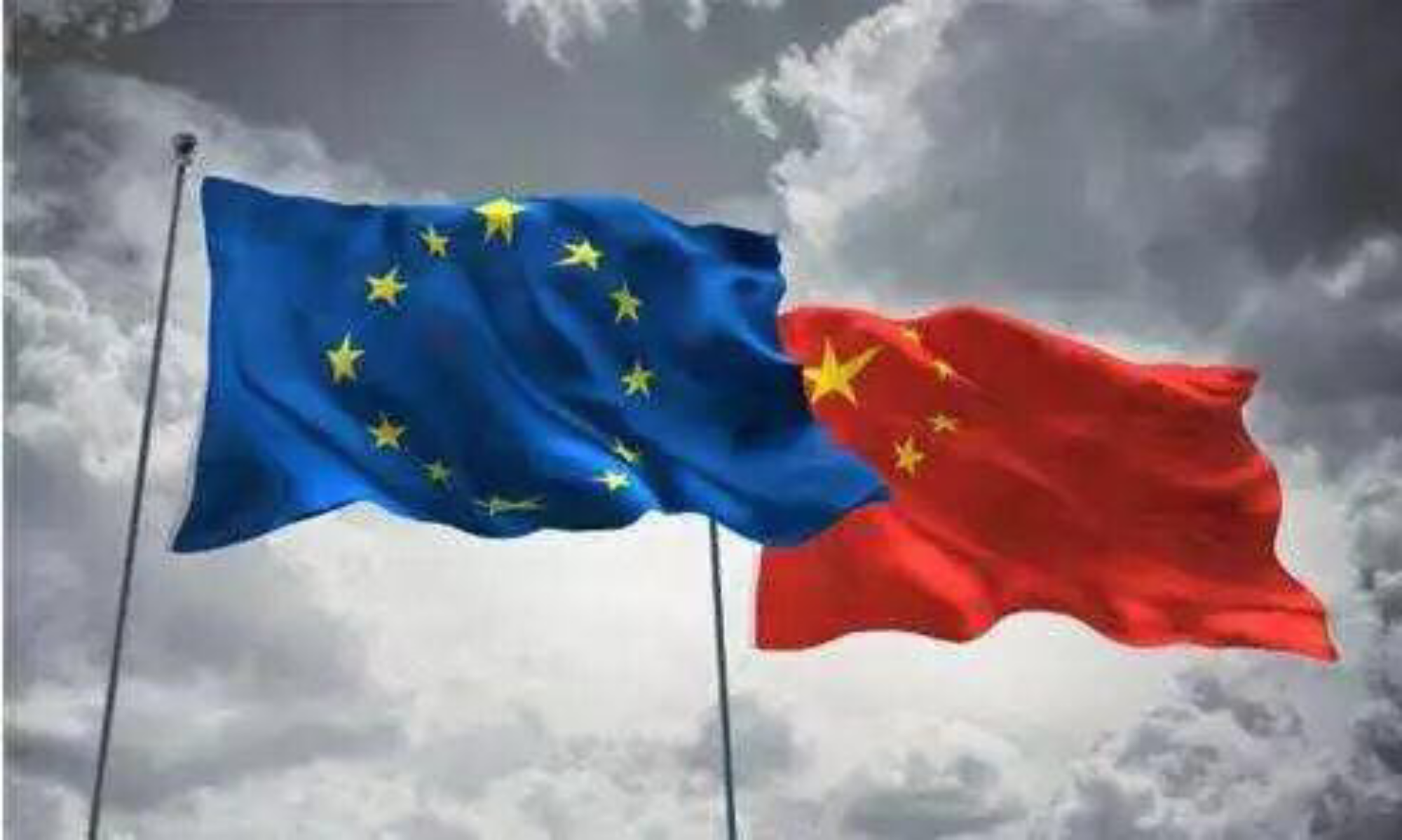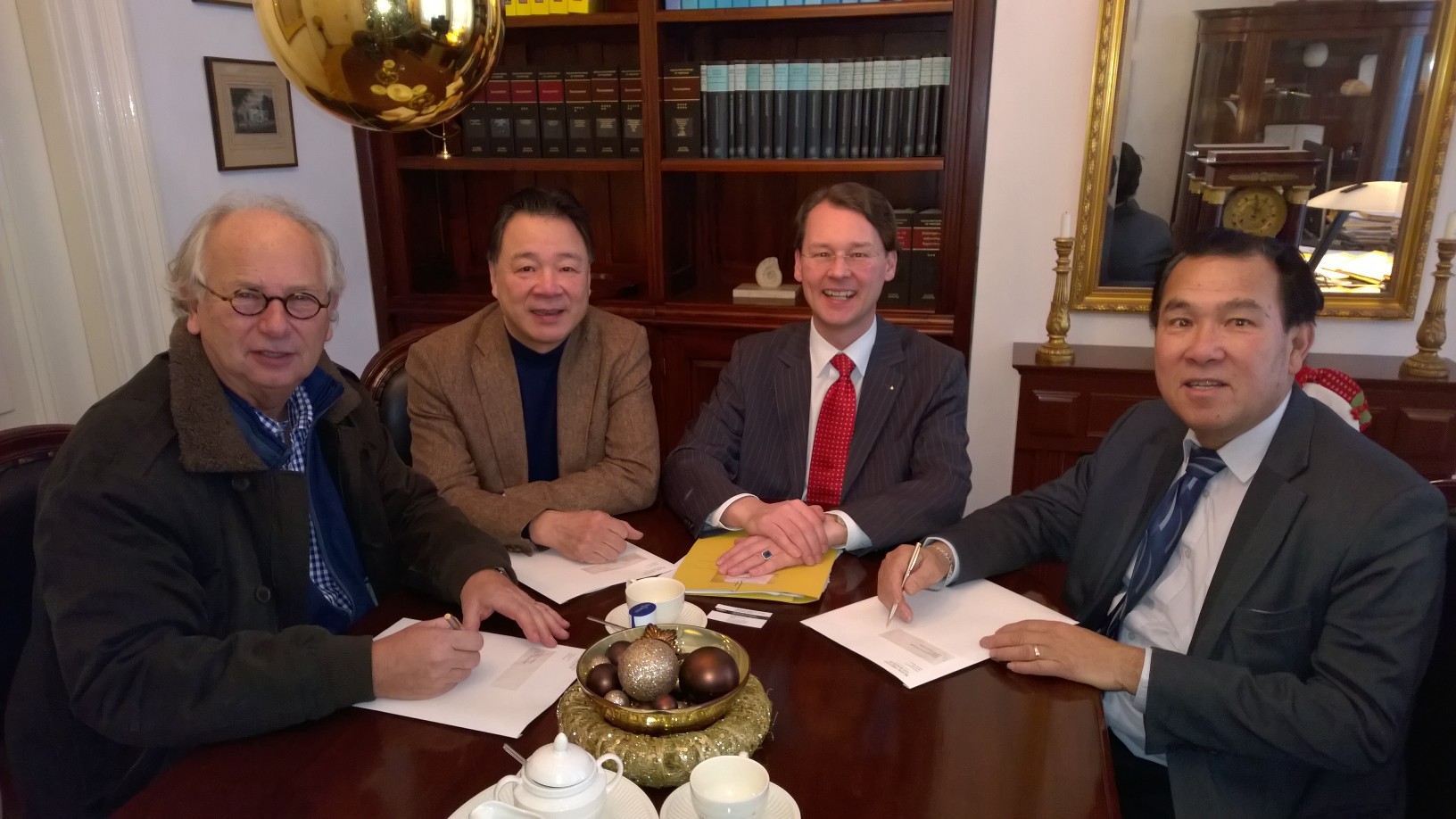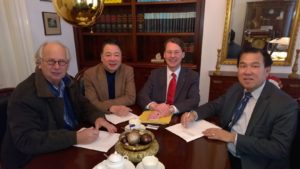Best friends,
From now on you will find many more, that you are a member of an organization that lives. It begins with the 2-month ECFA Newsletter that will receive all members. Of course, interested members may also contribute to Newsletters. It will be a Newsletter by and for ECFA members.
You will also find fixed sections in each number: a president’s wording, a description of a Chinese city, upcoming events, etc.
Anyone who is a member can attend all activities for free; Also symposia, congresses, monthly club afternoons where lectures are held and films about China can be viewed. For the various activities we need volunteers who can login via our email address. You will not regret it.
In order to make the newsletter accessible to anyone, English will be communicated. Of course, you can also visit our website between the periods of our newsletters. www.europeanchinafriendshipassociation.nl
Friendship with China must also manifest itself in visiting the country; Not all at the administrative level; Therefore, every six months a travel offer will be made at cost price for our members. Non-members pay ALWAYS € 200 more. The first trip will be organized in the last week of december.
Just two board members have been with a delegation from the European Parliament to some Chinese cities: Beijing (visited the headquarter of the Chinese Friendship Association), Zhengzhou, Yancheng, Shanghai. It became a very successful trip! Different agreements were signed with Chinese cities. All delegation members have promised to do hand and spatial services for the ECFA in their home country. First of all, they will discuss the need to join the ECFA. Meanwhile, there is already contact with the Czech Republic.
In July and August, the ECFA joined, when the Chinese Ambassador visited Purmerend resp. Alkmaar.
Next month (September) there is a conference in the city of Nanking about elderly care. The ECFA will also contribute here by attending two board members.
With the opening of the New Century Hotel in Amsterdam, the ECFA also found an defenitely office address. The address is Fogostraat 10. Here are also the ECFA meetings every month.
The ECFA supports the municipality of Purmerend in the planned trip to Jiangmen (Guangdong) in the autumn and has talks with the municipality of Montferland and Krimpen aan den IJssel about a relationship with a Chinese municipality.
In coöperation with the Chinese Culture Center and the Chinese Embassy, annual attention will be paid to some cultural activities. ECFA; we try harder!
Please pay attention fort he ECFA-trip in december. Joint his costprice trip to China.
Roy Ho Ten Soeng
ECFA-Chairman, august 2017
Appointment for the ECFA Chairman Mr.K.R.Ho Ten Soeng as oversees advisor of the province GUIZHOU.
————————————-
The Chinese Ambassador visits the cities of Purmerend and Alkmaar. ECFA members have been there too!
With the Mayo rand vice Mayor of Alkmaar
Visit the Cheesemarket in Alkmaar
In Purmerend with a visit at the BIO-MASS company
————–
A DELEGATION OF THE EUROPEAN PARLEMENT TO CHINA WITH ECFA
From july 15 to july 22, 2017 ECFA joined a delegation of the European Parliament to China to promote people to people cooperation for prosperity and friendship between Europe and China. The delegation consists of:
The following members of the European Parliament:
– Mr. Lambert van Nistelrooij, Netherlands, delegation leader;
– Mr. Franc Bogovic, Slovenia, vice delegation leader;
– Mr. Iuliu Winkler, Romania;
– Mr Krzystof Hetman, Slovenia;
– Mr. Stanislav Polcak, Tjech Republic;
– Mr. Jan Olbrycht, Poland;
– Mrs. Sofia Santos Roque Ribeiro, Portugal;
– Mr. Emilian Pavel, Romania;
– Mr. Momchill Nekov, Bulgaria.
The following staff:
– Mr. Cornelis van den Oosten, former senator and alderman;
– Mr. Marijn Verhees, policy adviser;
– Mrs. Bojana Cinzar, policy adviser;
– Mr. Woo Che Kwang, chairman Dutch Chinese Chamber of Commerce;
– Mr. Roy Ho Ten Soeng, chairman ECFA; former Chaiman VNC
– Mr. Ming Zhi Cai, general secretary Beijing Normal University;
– Mrs. Cornelia Stravers, director LandArt Diessen;
-Mrs. Johanna Okkinga-Godefroi, adviser Dutch Chinese Chamber of Commerce;
– Mr. Long Zhang, chairman Dutch China Trade and Economic Promote Association;
-Mr. Ke Chiao Hu, vice chairman World Federation of Zhenjiang Entrepreneurs;
– Mr. Wei Seng Woo, director JDU International;
-Mr. Djoen Swan Tan, management consultant Technology, treasurer ECFA;
– Mw. Shasha Liu, director Tulip Travel Agency, delegation secretary;
– Hr. Simon Mulder, student Cals College Nieuwegein, delegation photographer.
This China visit is organized by Mr. Chek Wang Woo. The programme is shown on the attachment. I joined the delegation for technical advice about improving windmill slip rings and solar panel inverters.
At Zhengzhou the delegation attended the Sino European Flower Trade Conference and visited the following three global companies:
– China Railway Engineering Equipment Group (CREG), manufacturer of large tunnel boring machines, TBM
– A transport company transporting goods 12 times a week between China and Europe.
– Chen Zhai flower market
During the Sino European Flower Trade Conference an agreement is signed by Mr. Woo and Mr. Hotensoeng about doing business with Dutch Flower traders and an agreement with the Wellant College in Aalsmeer.
At Yancheng the following companies were visited:
– Eco village and Holland Park.
– the Gold Wind windmill factory instead of the Jiangsu Dafeng Wind Power R&D Center.
– the Yangcheng Environmental Protection Agency.
– the Yangcheng auto spare parts enterprise instead of the Yancheng Trina Solar Company.
– the Big Data Industrial Park.
Because of the above mentioned programme changes, there was no oppertunity for me to discuss with engineers about improving windmill slip rings and solar panel inverters. If necessary, a separate visit will be organized to cover this subject. Mr Ho Ten Soeng makes an appointment with Yangcheng woodtraders and woodsellers from Surinam to do business. We will inform you about the results.
Dr. Ir. Djoen Swan Tan
————————–
CULTURAL EXCHANGES BETWEEN CHINA AND THE NETHERLANDS
This year nine Dutch museums organized exhibitions about Chinese – Dutch contacts in the Seventeenth Century. They present good overviews of the commercial and cultural contact in those days. Many items of old and beautiful Chinese porcelain, especially blue and white cups, cans and saucers, are displayed. And next to that the results of what is called Delft Blue porcelain: Dutch blue and white imitations of Chinese originals. Made in the old Dutch city Delft located in between the cities of Rotterdam and The Hague. Delft Blue is still produced today and sold in many tourist shops. Even to the yearly growing number of Chinese tourists (in 2016 more than 300.000!) visiting The Netherlands. So quite a number of Chinese people fly home with Dutch blue and white porcelain miniatures of cups, saucers and even porcelain copies of the typical wooden shoes!. In the older days yellow painted wooden shoes were worn by farmers when they milked their cows roaming in the muddy green and flat meadows. After the milking sessions the farmers and their wives used the milk to produce butter and the famous Dutch cheeses. Nowadays it is amazing how many Chinese tourists after their visit to Amsterdam and the surrounding bring back home not only Delft Blue but also Dutch cheese, especially the round ones. The lovely cheese smell must be observed during many flights from Amsterdam’s Schiphol Airport to the Far East.
The present exhibitions of Chinese and Dutch porcelains in the museums illustrate the commercial ties between China and Holland in the seventeenth and early eighteens centuries. In those days the links between China and Europe were mainly through the commercial city of Amsterdam. Business links not for the cheeses because those would loose their freshness during the long trip. But for instance for the majority of maps and books about China and printed in Amsterdam. And for the Chinese drawings as the one of a car driving forwards by the wind. That inspired in those days a Dutch engineer to construct a wind wagon. And it is striking to see nowadays the mutual interests between China and The Netherlands for the technical components of windmills.
ECFA observed the historical interest with porcelain, cheese, tourism and wind energy. ECFA is well aware about those historical links, but is also really open for links and cooperation now and in the near future.
That is why ECFA has started explorations to see how in mutual cooperation partners from China and Holland can cooperate among other themes in mutual arts exhibitions (not only seventeenth’s century porcelain, paintings, books and maps) and tourism (not only focused on cheese and Delft Blue). Quite soon ECFA hopes to inform interested parties about the first results of the explorations. And of course welcomes any suggestions.
Dr.Wim Westerman
Hidden Beijing: 10 intriguing sights to discover in the Chinese capital
As Beijing leaps skywards into the 21st century, its history can sometimes get left in the shadows. But despite the new highways and high-rises, China’scapital has plenty of past pockets hidden away to reward the intrepid explorer. Here are ten little visited, history-rich Beijing sights to get you started.
Kublai Khan’s city walls
In 1274, Kublai Khan commissioned a mighty set of earthwork walls to protect the new city of Dadu, capital of the triumphant Yuan dynasty. Unknowingly, the Mongol conqueror was laying the foundations for Beijing. Incredibly, more of the Dadu battlements remain today than those of Beijing’s Ming dynasty stone walls, torn down in the 1960s to make way for the Second Ring Rd. Take the subway to Beitucheng (the station’s name is a clue: ‘north earth wall’), and you can walk for more than two kilometres over the lofty earthwork mound, now landscaped into the Yuan-Dynasty Walls Relics Park. After dark, the wall becomes a popular gay hangout.
White Cloud Pagoda
Far from the lattes and lamb skewers of Gulou’s well-trodden hutong alleyways, the courtyards surrounding the gracefully bulbous Miaoying Temple White Dagoba exude a sleepy vibe, and wherever you turn, vistas of this pagoda towering over tiled rooftops will have you reaching for your camera. Designed by Nepali architects in the 13th century, the pagoda is the crowning glory of the Miaoying Buddhist Temple, which finally reopened for visitors in December 2015 after years of renovations.
Beijing badlands
In the shadow of the haunted Fox Tower (Dongbianmen) on the edge of Beijing’s former foreign legations, this grungy neighbourhood still carries echoes of its past life as a den of vice in the 1920s and ’30s. The site of a grisly murder brought to life in Paul French’s bestselling true crime novel Midnight in Peking, you can roam the badlands at night on the official ‘Midnight in Peking Walking Tour’ with Bespoke Travel Company (bespoketravelcompany.com). If you’re not up for a spine-tingling, you can also visit during the day – the Red Gate Gallery inside the Fox Tower has a collection of photos about the area’s intriguing past.
Warlord-era architecture
When the last Emperor of China was booted out of the Forbidden City 100 years ago, a warlord called Duan Qirui became the de facto ruler of a country in chaos. This gorgeous, grey-brick slab of classical Republican architecture (Duan Qirui Government Building, 3 Zhangzi Zhonglu), complete with clock tower, was built to serve as his HQ and residence, and later housed Chiang Kai Shek’s Nationalist troops. Despite a heavily-policed gate, you can stroll in at your leisure; don’t miss the lovely old wood-panelled university buildings at the back, an annex of Renmin University. Then seek out Peanut Cafe, a chill spot on the east side of the site, to sit and contemplate the ebb and flow of power over a caramel macchiato.
Mao’s underground city
In the grip of ’70s Cold War paranoia, Chairman Mao ordered a second city built beneath Beijing to safeguard the population should bombs begin to fall. For a few years until 2007, you could pay to access several dank shelters, a school and even a theatre 25ft under the Qianmen neighbourhood, but construction is fast eradicating all traces of the relatively shallow (and probably ineffective) tunnels. That said, everyone seems to know a rumour of some restaurant or other with a cellar that leads to the underground city. Ask around and you might still find a way down.
Beijing’s best museum
The Poly Art Museum is a trove of ancient Chinese artefacts located halfway up a glass skyscraper (you even buy your ticket from the office reception). Bronze ware and Buddhist sculptures are exquisitely displayed, not behind smudged glass but on artfully lit plinths. Much of the collection was purchased and repatriated from overseas auction houses; look out for six of the dozen ‘zodiac sculptures’ that once adorned a fountain in the Old Summer Palace. They’re still rounding up the rest.
Mini-Forbidden City (without the crowds)
Before Mao rebranded it the Workers Cultural Palace, this Forbidden City-in-miniature was once the Imperial Ancestral Temple, the most sacred slab of land in Beijing, where the Son of Heaven would make sacrifices to those before him. Waves of grand halls are accessed through a glorious yellow-glazed gate via parallel stone bridges, while the tranquil surroundings are strewn with pines and cypresses, including one venerable old tree said to be planted by Zhu Di, the third emperor of the Ming dynasty. Best of all, the Workers Cultural Palace has a great deal more genuine Ming features than its bigger brother, the largely rebuilt Qing-era Forbidden City next door.
798 ‘steampunk’ skywalk
The fact that 798 Art District, Beijing’s home of contemporary art, was once China’s most technologically advanced factory complex is no secret – the East German-designed Bauhaus workshops proved the perfect studio space for the artists like Huang Rui and Ai Weiwei in the ’90s. But scoot past the galleries and cafes to D-Park and you’ll find a veritable playground of retro-futurist Communist industrial architecture. Cutting through this is an elevated walkway offering gorgeous views of towers, chimneys, boilers, hissing pipes and gargantuan metal structures that together look like the ultimate steampunk movie set.
Tribute to Peking opera
One of the oldest opera theatres in China and a genuine relic, Zhengyici Theatre (220 Xiheyan Dajie, Xuanwu district; +86 010 8315 1649) was originally built in 1688 on the site of a Buddhist temple. With less than 100 seats, this two-storey, wood-panelled theatre is the most atmospheric spot in town to see Peking opera, a populist style championed by the foreign Qing elite after opera troupes from the south travelled to Beijing in 1790 to perform for Emperor Qianlong’s 80th birthday bash. For true connoisseurs, the older, more scholarly kunqustyle is also performed here. Or catch the ‘Mei Lanfang Classics’, a tribute to Peking opera’s maestro, Mei Lanfang, who trod these very boards in the early 20th century.
Water dragons of Houhai Lake
Encircled by willow trees and beer bars, Beijing’s pleasure lakes of Shichahai were long ago part of a port that connected directly with the Grand Canal, via a branch line to Beijing’s southeastern suburb of Tongzhou. Under the worn cobbles of Houhai Lake’s Wanning Bridge on Di’anmen Waijie, a pair of stone-carved ‘water quelling beasts’ are universally ignored by busy Beijingers, but they’ve guarded this strategic waterway since the 1200s. To learn more about Beijing’s innovative Yuan dynasty waterways, check out the neat little museum inside Huitong Temple north of Xihai Lake, documenting the work of Guo Shoujing, a 13th-century astronomer and canal engineer.
TRIP TO CHINA for all members!
In the first part of december the ECFA will organize a trip to CHINA. This will be a costprice trip to Beijing. Costprice = €795.
Price included Flightticket from Schiphol, Hotel **** and Breakfast, ECFA tourleader .
The program is available for all who want to join this trip hotensoeng@multiweb.nl
On october 1, the regitration deadline for this trip closes. We hope to travel with many friends who are looking for FRIENDSHIP with CHINA
ECFA COMING MEETING:
Friday september 29 at 19.30u: Doing Business with China



